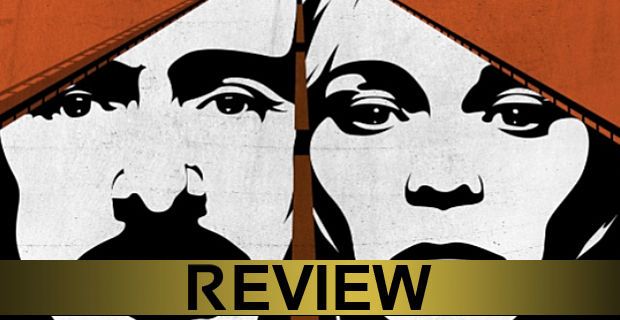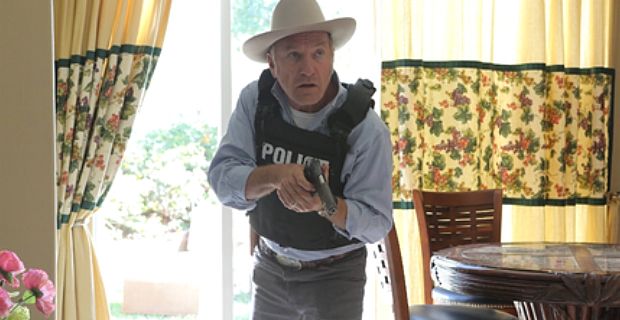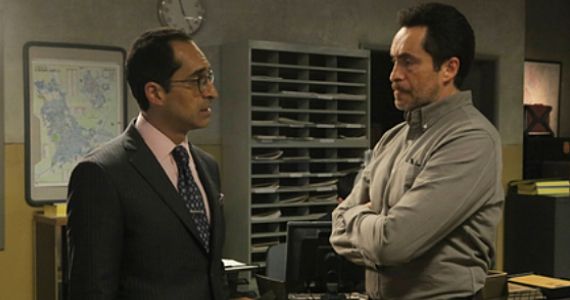[This is a review of The Bridge season 2, episode 9. There will be SPOILERS.]
-
The Bridge gets lean and mean this week, with one of the most straightforward and bloody stories of the season. The episode takes its title, 'Rakshasa,' from the wicked Hindu spirits of the same name who are known for their bloodlust and for being man-eaters. It is a rather apt title, considering the slight cast for the week (no Frye and Adriana, nor Linder and Eva), and the episode is split up into to two storylines that again bring the narrative back to Fausto Galvan's own endless bloodlust, even while he's running for his life.
Overall, it's nice to see The Bridge tighten its focus down to a few primary characters and link them in such a way that they needn't be seen onscreen together in order for the connection to be made explicit. It is an efficient episode, the serviceability of which is owed in large part to writer Marisha Mukerjee's swift exposition that either spells out what the characters are up to or gets those in the dark up to speed - not only at a remarkable pace, but also in a way that elevates the tension while delivering insight into the characters' wants and needs.
And as the story eventually comes together over two separate – and again, swift – showdowns, it's clear that the twin climaxes of 'Rakshasa' are going to be as ferocious as the spirits for which the episode is named.
Right now, everything continues to revolve around Fausto, as his reaction to the near collapse of his empire has escalated to a degree that he's lashing out at anyone who has crossed him. This is in keeping with Fausto's arc this season, in that swift, brutal, unforgiving retaliation is the law of the land. It is the universal language that's understood on either side of the border, but the escalation of violence makes him more of a target than ever – for people operating on both sides of the law.
And therein The Bridge seeks to examine the gulf between the various ideologies seeking essentially the same thing. Legally speaking, Sebastian Cerisola is no different from Fausto Galvan. It's the way he approaches his business – i.e., the drug trade – that sets him apart from his predecessor and now mortal enemy. To put it in the most obvious terms, Cerisola is a privileged businessman, whereas Galvan is a scrappy fighter who managed to rise far above where he started. Cerisola uses the CIA as much as the CIA uses him, whereas Galvan is far too much of an alpha to ever grant anyone a say in his business.
In a way, that reluctance to give up control, even when it suits his best interests, explains many of Galvan's actions this season. These acts of vengeance he was doling out were essentially acts of rebellion against an authority whose level-headedness he chose not to recognize.
In that sense, the relative simplicity of Galvan's empire, and his reactions to Cerisola's request that violence be kept at a minimum, lest the government get involved, were essentially a rebellion against corporate hegemony of what once was a homegrown business.
Fausto's attack on Eleanor and Charlotte at Red Ridge View, then, is the final severing of the ties between Galvan and his would-be partner Sebastian Cerisola. The fact that DEA Agent Joe McKenzie and Hank Wade – who wind up either dead or injured, after being caught in the violent crossfire – are also in the house at the time of the attack is just another example of how Galvan's rebellious, near-sighted, violent reprisals are only exacerbating his monumental problems.
And the happenings elsewhere feel much the same, but Sonya's predicament with the Chopper works differently from Galvan's response a Red Ridge View. Instead of distancing characters from one another, the Chopper's actions work to bridge the divide between Marco and Sonya, physically as well as ideologically. He may have been little more than a simple plot device, and his actions were basically just a stalling tactic to keep Sonya and Marco away from the DEA and Hank's (and Charlotte's) bloody standoff with the cartel, but the Chopper at least functioned perfectly as that device.
Besides, as the series slides into the final few episodes of season 2, it's far more important for Sonya and Marco to be aligned with one another than to have an extraneous antagonist running around. This is especially true now that the fallout of the Red Ridge shootout needs to take center stage.
The accord Sonya and Marco come to in the closing moments illustrates how, when circumstances call for it, differing methods can work in tandem to achieve the same goal.
It also underlines the widening schism between Galvan, Cerisola, and Eleanor. And by sending the various parties involved away from or toward one another, 'Rakshasa' sets the stage for a dramatic climax.
The Bridge continues next Wednesday with 'Eidolon' @10pm on FX.
Photos: Byron Cohen/FX



